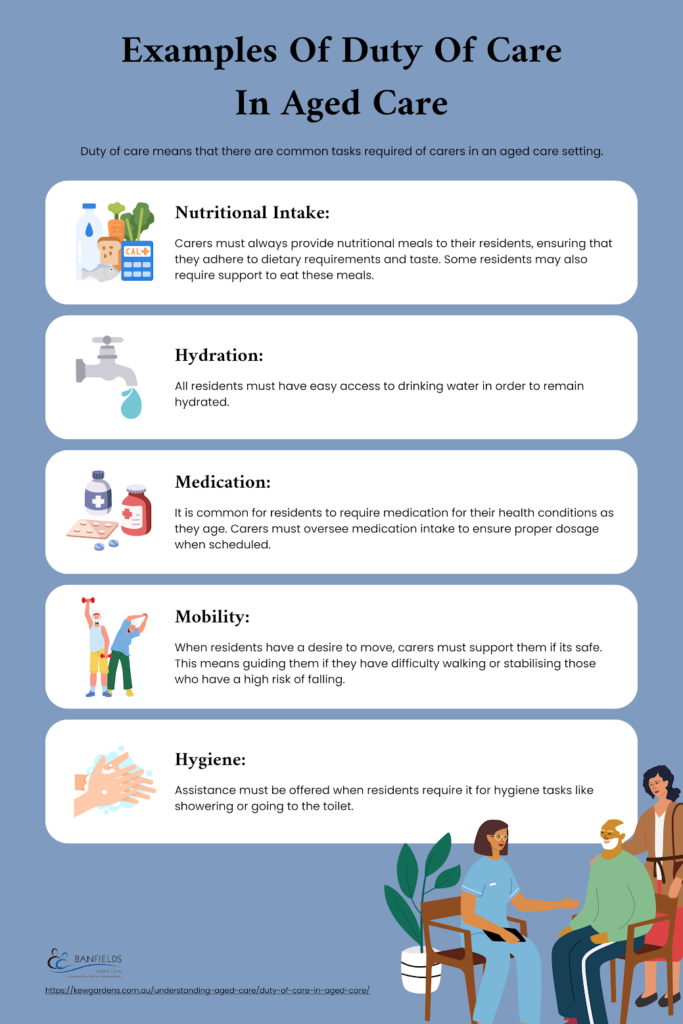Duty of Care is a term that is often used to refer to someone’s professional responsibility to act in their client or resident’s best interests. In the aged care industry, duty of care encompasses a number of requirements that apply to both home care and residential care.
What is Duty of Care in Aged Care?
Duty of care in aged care is the responsibility of workers and carers not to cause harm or injury to anyone under their care and to uphold their rights. This means providing a standard of care and comfort as well as listening and allowing the person to make their own choices. Any instances of neglect or carelessness would be considered breaching the duty of care.
Everyone who works in the aged care industry has a duty of care to the clients or residents, and also to other staff and to the general public. All support and aged care staff must take care to minimise the risk of harm to another person through their actions.
There is a responsibility to ensure that the person is safe and poses no danger to themselves or others, but also that their rights and wishes are being respected. For example, if an older person wants to walk to the shops in the morning but has a tendency to get disoriented, someone might walk with them to enable them to participate in this activity safely.
Additionally, duty of care means making sure that residents or clients are in a clean, safe, comfortable environment and that they are provided with quality clinical care. For example, staff members should make sure that an older person is warm enough when they go to bed and that they have a heated blanket if they need it.
Charter of Aged Care Rights
The Charter of Aged Care Rights describes the rights of an older person receiving care from an Australian Government-subsidised aged care service. These rights apply to all those who receive care, regardless of the type or level of care.
This document helps an older person, their family members and carers to understand what to expect from aged care services.
The aged care provider has a responsibility to make sure that the older person understands their rights as dictated by the Charter. The person may need an aged care advocate to help them understand the document. The provider must supply a copy for the person to sign – this applies to every aged care provider that the person receives care from, even if they supply different services. Signing the Charter is not a prerequisite for receiving care.
The Charter of Aged Care Rights lists 14 rights that anyone who receives aged care services is entitled to.
The Importance of Duty of Care within an Aged Care Setting
Duty of care refers to the minimum requirements for looking after someone in an aged care setting, but it’s also important to consider standard of care and dignity of risk.
Standard of care is concerned with the quality of care that is provided. It means ensuring that the care that is offered is tailored to the person’s needs. This might include the more personal aspects of care, like providing a vegetarian option for meals. It also might include offering recreational activities, social groups or supervised outings to help the older person maintain a good quality of life.
Dignity of risk means allowing people the independence to make their own choices and take reasonable risks if they want to. They should have control over their personal and social life, even if their choices involve personal risk. For example, if an older person wants to shower on their own but they can’t stand up by themselves, a care provider may be able to set up a chair in the shower for them.
Examples Of Duty Of Care In Aged Care
Some examples of duty of care tasks in an aged care setting might include:
- Making sure that the client has nutritious meals that suit their dietary requirements. Workers would also be required to ensure that the client eats these meals and that they have support to do so if they need it.
- Making sure that the client has access to enough drinking water.
- Ensuring the client takes their correct medication, if they need any.
- Accompanying the client when they move around if they have trouble walking or are at a high risk of falling.
- Ensuring the client is provided with assistance to shower and use the toilet, if they need it.

Going Beyond Duty of Care
Duty of care is essential and legally binding, but standard of care is just as important. When you begin the search for aged care providers for you or your loved one, it’s important to look for providers that go above and beyond the basics of care and support.
Kew Gardens provides quality aged care that has a focus on treating residents with respect and dignity and helping them feel connected to their environment. The duty and standard of care at Kew Gardens is approached with a high level of attentiveness, to ensure that every resident receives quality care.
Consequences Of Breach Of Duty Of Care In Aged Care
Breaching the duty of care could result in a negligence of duty of care claim being brought forward. The incident can be reported and there may be consequences, which could include a civil case or criminal prosecution.
In cases where a legal claim is not made, breaches of the duty of care could still have negative consequences because it can affect a business’ reputation.

